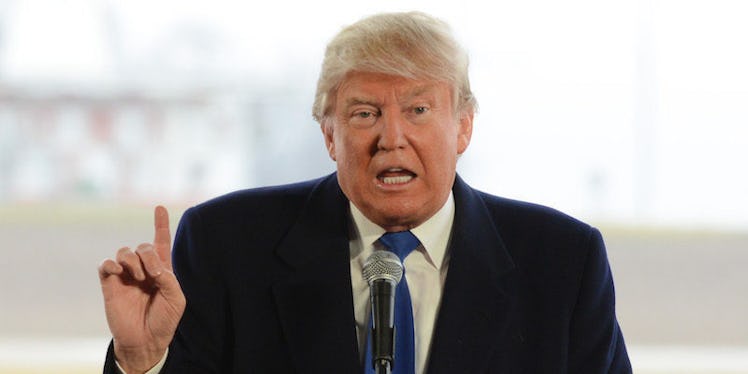
This Is The Other Wall That's Beginning To Concern Donald Trump
Next month will be the anniversary of the day Donald Trump descended a golden escalator into American politics and announced his candidacy for the Republican presidential nomination. His promise to build a wall around the Mexican border resonated with the 11 million people who have so far voted for him throughout the Republican primaries.
But while Trump has been speaking of building one wall, he's also been working to tear down another.
The “blue wall” is a term referring to the 18 states — plus the District of Columbia — that have been won by the Democratic candidate in the past six presidential elections. These states and their number of electoral votes are as follows:
California (55), Connecticut (7), Delaware (3), Hawaii (4), Illinois (20), Maine (4), Maryland (10), Massachusetts (11), Michigan (16), Minnesota (10), New Jersey (14), New York (29), Oregon (7), Pennsylvania (20), Rhode Island (4), Vermont (3), Washington (12), Washington DC (3) and Wisconsin (10).
Together, they add up to a commanding lead of 242 electoral votes for the general election. This means that if history were to repeat itself in 2016, Hillary Clinton — the likely Democratic nominee — would begin with 89 percent of the 270 delegates needed to win the presidency. It's kind of like starting off a marathon just around the corner from the finish line.
All she would need is a big win in a battleground state like Florida (29), or a pair like Ohio (18) and Virginia (13) to seal the deal. However, the Trump campaign is adamant about its ability to pull those swing states to the right and even flip some blue states.
"I will win states that no Republican would even run in," Trump told the Associated Press.
Northeastern blue states are at the top of the Manhattan real estate mogul's to-do list as he begins to beef up his campaign staff on the ground. Trump will have to shoot for a footprint in the Northeast that's similar to Ronald Reagan's in 1984.
Earlier this month, Trump polled just one point behind Clinton in Pennsylvania (20), which hasn't been won by a Republican since George HW Bush's mega sweep in 1988. However, winning over New York (29), which last turned red for Reagan's second term, would be a nearly impossible feat, given Clinton's stronghold on the Empire State. Winning over other lighter blue states throughout the country like Colorado (8) and New Hampshire (4) will be the test to see if his appeal to white, blue-collar voters is enough to tilt the electoral map in his favor.
The Trump campaign says it already has the momentum it needs. The Republican frontrunner – who considers himself "very much a uniter" – has argued that he's brought in “millions and millions” of new voters to the Republican primary process.
But, the data seems to differ. While he has definitely brought in new members to the primary, he hasn't proven he's brought in new numbers to the Party. These scores of voters who are participating in the Republican primary for the first time are mostly Republicans who have been around and voted in general elections. They just haven't voted in past primaries.
In other words, they're the same people. But, they've been motivated to participate earlier in the process due to Trump's energizing campaign.
Still, given the roller coaster of an election season 2016 has been, it's difficult to predict whether or not the blue wall could block the Trump train in November. After months of Clinton dominating Trump in the national polls — sometimes even by double digits — the race seems to be tightening as the smoke clears from these last few contests.
Last week, Trump beat Clinton 45-42, according to a national poll conducted by Fox News. But Real Clear Politics has Clinton ahead by three points.
This sort of teeter-tottering is probably not going away. With two historically unfavorable candidates as the presumptive nominees, the attack ads have only just begun rocking the polls back and forth.
Both candidates are preparing for a summer of fighting fire with fire. The only question is, will the blue wall hold? Or, will it be another victim of the Trump phenomenon?